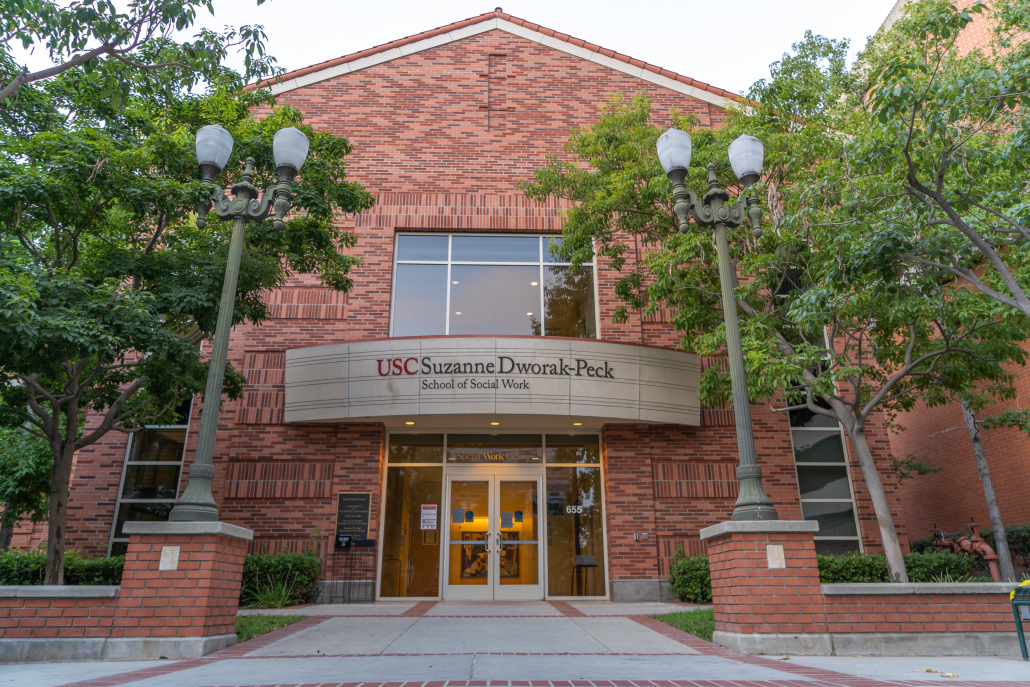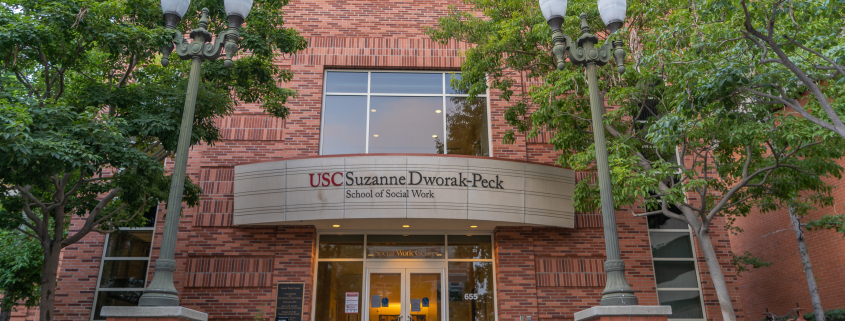USC to offer first undergraduate course on homelessness

Born and raised in Los Angeles, Kyara Galloway said she saw that homelessness has “always been a problem,” but in discussions to solve it, people experiencing homelessness were often dehumanized, and spoken about in a way that wouldn’t solve the issue.
So, when she heard about USC’s plans to offer their first academic class on homelessness, she knew she wanted to partake in it.
“I want to solve [this problem],” said Galloway, a senior majoring in philosophy, politics and law. “I want to be around people that want to have this discussion and be a part of the … solution to a problem in L.A. right now.”
Created by Director of the USC Initiative to End Homelessness, Brenda Wiewel, and associate professor of social work Benjamin Henwood, the University’s first academic class on homelessness and its complexities, challenges and possible solutions will be offered in Fall 2021 by the Suzanne Dworak-Peck School of Social Work. The two unit undergraduate class will provide “the real basic foundation” to students looking to learn about the issue, said Wiewel.
The curriculum addresses people experiencing homelessness in its “modern day version” as it has changed throughout history. Students gain an important understanding of how homelessness looks the way it does today, particularly with social policy and decisions, Henwood said.
“[The class] looks at [homelessness] both upstream and downstream,” Wiewel said. “[It looks at] what’s happening to the people who are actually living on the streets chronically for years, and it also looks at people who are at risk [with] housing insecurity and how does that lead to homelessness.”
Currently, The Center for Homelessness, Housing and Health Equity Research at the School of Social Work provides special leadership development and skill-based training to master’s students going into the homelessness field, according to Henwood. However, Wiewel said undergraduate students working in service learning or internships are going into the field without essential background knowledge.
“At any level, this is a problem [people] see with their own eyes every day,” Henwood said. “Having the expertise at USC and not utilizing it to help educate undergrads and be aware of the social justice issues that are involved in this topic seems like a missed opportunity.”
The class aims to give students a better understanding of the history and contributing factors behind people experiencing homelessness through multiple perspectives.
“One of my top priorities is that when people graduate from USC, they have an educated understanding of the complexities of why it’s so hard to solve homelessness, what are some realistic kinds of issues, as well as reducing some of the stereotypes people have,” Wiewel said.
Among its complexities, the class looks at how homelessness intersects with clinical issues, inequality and racism. Henwood said he hopes to better address these intersections as he feels current discussions on homelessness “confuse some of the issues involved in it.”
“We’ll touch on a lot of what we call structural problems that contribute to the problem [of people experiencing homelessness],” Henwood said. “We’ll talk about what I think people often see, which are these obvious ways in which mental illness and substance abuse might contribute to the issue … but that’s not confined to people on the street, and so it’s not really an explanatory factor.”
Galloway said it’s exciting to think about how increased academic knowledge on the topic of people experiencing homelessness will help in finding a solution.
“The importance of academia and having a class like this is that we can start producing that knowledge to create a change or to create a new narrative about houseless people,” she said.
According to the National Alliance to End Homelessness, job losses from the pandemic are only set to increase the already growing homeless population. For Galloway, having a course by the University focused on homelessness in the present is different from all of her other classes.
“[The University] has a class that’s like, ‘Here’s the moment that we’re in right now, and how can we effectively impact that moment?’” Galloway said. “I think that’s what’s so different about all my other classes is that we’re talking about previous moments and how they led up to where we are right now, whereas this class, it’s going to be in the present, and doing things I can change right now.”
Henwood said he wants students to gain critical thinking and multiple perspectives on an issue people experience every day.
“The important part [of the class] is the use of critical theory and research and empiricism to understand conditions, and to be able to analyze both those explanatory and contributing factors to better understand why these are socially complex problems,” Henwood said.
For the future of academia, Wiewel said she hopes this class is only the beginning. She envisions additional courses within specialized topics and the development of a minor in homelessness.
“This could be a course that I imagine the demand [for] will grow,” Wiewel said. “People that are studying in a variety of fields where they see that there may be an intersection [with homelessness] would be able to take that course.”

